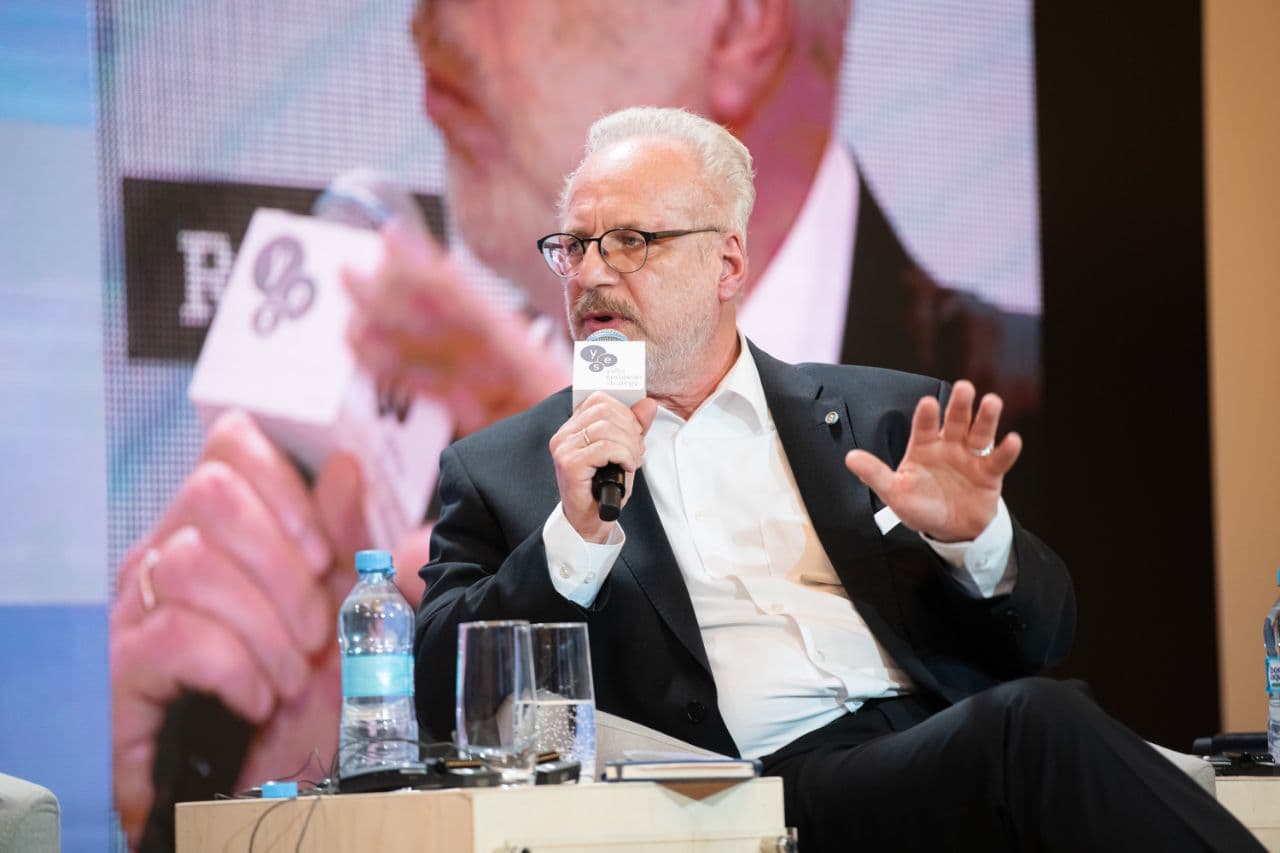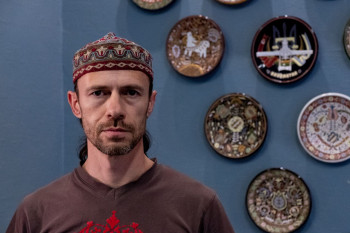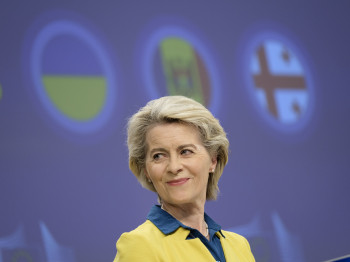Latvian President Levits: ‘Ukraine will be strong EU member in relatively short time’

From day one of Russia’s full-scale invasion, Latvia has been among Ukraine’s most outspoken supporters.
Having been occupied by the Soviet Union, Latvia has been open about considering Russia as a threat to its own security. And Latvia was making it clear it will do everything it can to help Ukraine.
The country, led by President Egils Levits, provided Ukraine with several pieces of 155mm self-propelled artillery and Soviet-made Mi helicopters.
Latvia has spent over 0.8% of the country’s GDP in aid to Ukraine, second only after Estonia, and has been vocal in support of Ukraine’s EU candidate status and the need to stop Russian political and economic influence over Europe.
Its parliament has declared Russia a state sponsor of terrorism and its war against Ukraine a “targeted genocide.”
Levits told the Kyiv Independent that Latvia “understands very well” what it is like to be attacked by Russia, and, therefore, it’s natural for Latvians to want to help Ukraine.
On the sidelines of the 17th annual Yalta European Strategy (YES) conference, held on Sept. 9-10 in Kyiv, Levits talked with the Kyiv Independent about why it's important for Latvia to support Ukraine, how Europe will counter the Russian-orchestrated energy crisis, and what Ukraine needs to do to be accepted in the EU.
The Kyiv Independent: Why, from the start of this war, has your country been so active in supporting Ukraine?
Egils Levits: We can understand the feelings of Ukrainians because of our history. We were occupied for 50 years by Russians. We see the same (aggressive) ideology now attacking Ukraine.
And we completely understand that feeling of injustice and this tragedy that happens to Ukraine, and, therefore, of course, we are supporting Ukraine, supporting militarily, supporting economically, and supporting politically. I would say, it’s quite natural for us.
The Kyiv Independent: Why do you think there’s such a different response coming from Germany and France, compared to Latvia and Poland?
Egils Levits: They don't have this specific historical experience. But they're our allies, Ukrainian allies, and they understand now that in order to preserve freedom in Europe, in the European Union, in NATO countries, in Ukraine also, it is necessary to help Ukraine.
This is the main goal of all Western countries, but the intensity of course is a little bit different. We should keep the unity in the European Union and NATO so that the whole Western Bloc is supporting Ukraine. This is very important.
The Kyiv Independent: Do you see the support wearing down? Half a year into the war, maybe more people are dissatisfied with the amount of money spent on Ukraine?
Egils Levits: No, the European Union is going in the direction of being more realistic. A realistic approach is to see that Russia is an aggressor, endangering not only Ukraine but the whole of Europe.
And therefore, it is necessary to defend Europe, defend the free world, and defend Ukraine. This is the general tendency.
Of course, the energy prices are worrying, but we should see security issues in Europe and these energy prices together, and then we see that our freedom is much more valuable.
And therefore, the majority of Western society is supporting the aid for Ukraine. There is Russian propaganda, which is trying to influence some parts of Western societies, but they are not very successful.
The Kyiv Independent: In Latvia, a quarter of the population are Russians or Russian-speaking. Do you see opposition to helping Ukraine?
Egils Levits: As I've said, Russian disinformation is influencing Western societies. We, Latvians, are also a typical Western society, with a majority (of the population) on the side of Ukraine and a small minority which is under the influence of Russian propaganda.
So we don't see that there is a big difference, for example, to Germany or France, or other countries, compared to Latvia, so it is very very important that the large majority bases itself on our common democratic values.
In a democracy, there are always pluralistic views. And if there are no real violations of the laws, then, of course, these views could be expressed because we are a country based on the rule of law.
But if there is a violation of our legal order, of course, there would be consequences, like in other European countries, which are based on the rule of law.
The Kyiv Independent: Russia has just shut down the Nord Stream 1 pipeline, and President Volodymyr Zelensky said yesterday that, probably, Russia won’t ever turn it back on. Can this influence some European countries and lead to less support for Ukraine?
Egils Levits: I don't see this tendency. It was a failure of some Western countries to rely on this cheap gas. The Baltic countries, and Poland, have always said that it is a danger, but now the danger has become real, and we should act accordingly to move away from Russian gas.
So this goal to move away from (Russian) gas, from petroleum, to green energy was already mentioned in 2019 in the European Union Green Deal. Now it will be achieved much faster than previously. There is no way back to Russian gas and to dependency on Russia.
The Kyiv Independent: Do you think it is possible for Ukraine to join the EU soon, or Ukraine was given candidate status in advance, and accession will take years?
Egils Levits: Latvia has, from the beginning, supported the idea that Ukraine one day should be a member of the European Union. I said that years ago. After (the full-scale) war began, we decided, after some discussions, that now is the time to give Ukraine the status of a candidate state.
It was our policy, Latvian policy, Estonian, Lithuanian, Polish policy, and others, and in the end, it was a common unanimous decision of all European Union countries.
The European Commission delivered some preconditions before the accession talks could start, seven conditions, most of which are already fulfilled (by Ukraine). Some others could be fulfilled in a few months maybe, in a relatively short time. And our position is now that when all seven preconditions are fulfilled, then we should quickly start negotiations.
The negotiation process could last some time, so to say. For Latvia, it was several years. I think if we are concentrating on both sides, on the European side and the Ukrainian side as to the willingness to reform the country, then it is possible to achieve this goal relatively quickly.
I will not mention a date or time, but it (quick accession) is possible if both sides agree that this is the goal that we should achieve. Because, it is realistically possible that in a relatively short time Ukraine becomes a European Union member state.
Ukraine, after the reforms and after the experience of this war, I think, will be a strong European member state, which is based on democratic values, because you are fighting for that. Ukraine is fighting now for these values.
I really think that in a relatively short time, Ukraine will be a member state.











